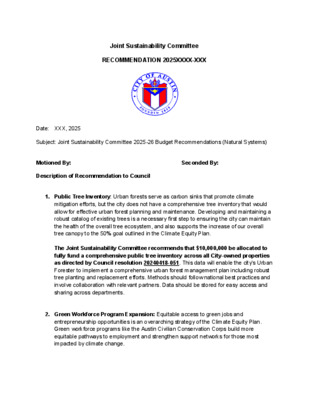11. JSC Natural Systems Budget Recommendations - Draft — original pdf
Backup

Joint Sustainability Committee RECOMMENDATION 2025XXXX-XXX Date: XXX, 2025 Subject: Joint Sustainability Committee 2025-26 Budget Recommendations (Natural Systems) Motioned By: Seconded By: Description of Recommendation to Council 1. Public Tree Inventory: Urban forests serve as carbon sinks that promote climate mitigation efforts, but the city does not have a comprehensive tree inventory that would allow for effective urban forest planning and maintenance. Developing and maintaining a robust catalog of existing trees is a necessary first step to ensuring the city can maintain the health of the overall tree ecosystem, and also supports the increase of our overall tree canopy to the 50% goal outlined in the Climate Equity Plan. The Joint Sustainability Committee recommends that $10,000,000 be allocated to fully fund a comprehensive public tree inventory across all City-owned properties as directed by Council resolution 20240418-051. This data will enable the city’s Urban Forester to implement a comprehensive urban forest management plan including robust tree planting and replacement efforts. Methods should follow national best practices and involve collaboration with relevant partners. Data should be stored for easy access and sharing across departments. 2. Green Workforce Program Expansion: Equitable access to green jobs and entrepreneurship opportunities is an overarching strategy of the Climate Equity Plan. Green workforce programs like the Austin Civilian Conservation Corps build more equitable pathways to employment and strengthen support networks for those most impacted by climate change. The Joint Sustainability Committee recommends that $4,000,000 per year be allocated to permanently fund the Austin Civilian Conservation Corps. This funding would be used to support and expand the following tracks: ○ Natural Systems (protecting critical ecosystems on City land, green infrastructure development, wildfire mitigation, enhancing the City’s trail network) ○ Clean Energy (solar for all, energy efficiency, demand response, batteries) ○ Environmental Education ○ Zero Waste (expand beyond computer refurbishment) 3. Natural Land Restoration and Wildfire Prevention: Most city parkland natural areas have not been managed for ecosystem health and are thus degraded. Threatened by heat, drought, disease, and wildfire, they present safety risks to both park users and neighbors. In 2023, City Council approved the Parks and Recreation Department’s Land Management Plan, created to guide the restoration of natural areas to improve climate resilience and reduce wildfire risk. The program currently has a budget of $828,000 and four FTEs to oversee the 10,300 acres under city management. The Joint Sustainability Committee recommends fully funding this program at an estimated cost of $250 per acre per year for a total cost of $2,575,000, which will allow the program to expand efforts to address biodiversity loss, wildfire risk, and tree mortality. 4. Land Acquisition and Preservation: According to the Austin State of the Food System Report (2022), less than 0.6% of food consumed in Travis County is produced locally and 16.8 acres of farmland are lost daily to development. The Austin/Travis County Food Plan (Goal 1) prioritizes expanding community food production and preserving agricultural land, and the Austin Climate Equity Plan (Natural Systems Goal 2) aims to protect 500,000 acres of regional farmland by 2030. The Joint Sustainability Committee recommends that: ● $50,000 be allocated to conduct an inventory of agricultural land for potential acquisition, as well as identify existing City-owned land that could be utilized for agricultural purposes; and ● $2,000,000 be allocated to establish a revolving loan fund dedicated to protecting farmland through conservation easements or direct land purchases, prioritizing regenerative agriculture practices. This fund could also attract philanthropic or private investment and serve as a foundation for future bond funding expansion. 5. Regenerative Agriculture: The Austin-Travis County Food Plan and the Austin Climate Equity Plan identify regenerative agriculture as a key strategy to strengthen the community food system and meet climate goals. The Resilient Farm Planning Framework provides a clear, science-based definition of regenerative agriculture by incorporating USDA Natural Resources Conservation Service (NRCS) Conservation Practice Standards, which will help quantify the climate benefits of regenerative practices, extend their application beyond farms to public parks and green spaces, and enhance coordination among City departments. The Joint Sustainability Committee recommends that: ○ $50,000 be allocated to expand the Food and Climate Equity (FACE) grant program, funding five $10,000 grants for agricultural producers to implement Resilient Farm Plans, and ○ $200,000 be allocated to support a pilot project for developing and implementing a Resilient Farm Plan (also known as a “Carbon Sequestration Plan”) at a municipal park such as John Treviño Park to improve soil health, quantify and enhance carbon sequestration, and serve as a model for potential expansion across all 17,000 acres of publicly owned parkland. 6. Floodplain Reforestation: The Austin Climate Equity Plan aims for 50% citywide tree canopy coverage by 2050 and emphasizes protecting water quality and supply. To address disparities in tree coverage, ecosystem degradation and health risks from extreme heat, the City should pursue aggressive tree planting efforts in heat-vulnerable distressed eastern watersheds, where creeks are more degraded. Reforesting floodplains by planting trees along creeks improves flood control and water quality, protects ecosystems, and supports public health. Currently, Watershed Protection’s Floodplain Reforestation Program restores about 10 acres of public land per year at a cost of $143,000. Expanding these efforts is crucial, but recent local nursery closures have strained the diversity, quality and availability of native tree seedlings, posing a challenge to expansion. The Joint Sustainability Committee recommends that: ○ $400,000 be allocated to expand floodplain reforestation efforts, focusing on green jobs development, likely through external partnerships with community organizations. A cross-departmental solicitation to complement existing programs should be considered. These initiatives support environmental education and promote public stewardship. ○ $400,000 be allocated to support native tree sourcing. In partnership with community-based organizations, this could fund tree nursery infrastructure, including greenhouses and shade structures, electricity and water access, storage areas, and equipment for both existing and new native tree nurseries. Funding is necessary to secure a reliable supply of native trees that are adapted to survive Austin’s climate.